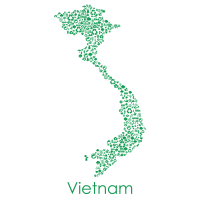5. Public Private Partnership
The government is the largest buyer of goods and services in Vietnam. If we include provincial and municipal governments and state-owned enterprises, the potential for sales to this sector is very large: government spending, in fact, stands at around 9.5% of GDP 1.
Vietnam became a member of the WTO in January 2007, however it has not joined the WTO's Government Procurement Agreement (GPA), so the treatment of foreign suppliers is entirely governed by domestic law.
The Public Procurement Act (Act No. 43/2013/QH13 of 26 November 2013) provides that:
-
Chapter 1 (General provisions)
-
Art. 5 (eligibility of contractors and investors)
-
par "g)": the possibility of creating short-lists is foreseen
-
par "h)" The foreign contractor may participate in procurements classified as international and must have a partnership with a national contractor , unless no contractor has any expertise relevant to the procurement
-
-
Art. 14 (preferential treatment in the selection of the contractor)
-
par "b)" Preference is given to foreign contractors with a partnership with a national contractor who takes charge of at least 25% of the works assigned by the contract
-
-
-
Chapter 11 (Prohibited Acts and Handling Bid Violations)
-
art. 89 (Prohibited Acts in Competitions)
-
par 5 (Interferences)
-
point "i)": It is prohibited to impose specific requirements regarding brand names and the country of origin of the goods in the invitation to tender documents applicable to the package of offers for the procurement of goods, for construction and installation and mixed offer packages when applying open, limited and open tender forms.
-
-
-
In summary, the general rule is that: imported goods are allowed, due to the fact that the definition of a specific origin is prohibited, but foreign companies can only participate in tenders classified as "international" and after having defined a partnership with a local contractor ; furthermore, preference is given to those partnerships in which at least 25% of the awarded contract is paid by the local partner. In any case, the contracting authority can proceed to create a short-list of suppliers.
Exceptions to the general rule may be tenders issued for projects financed through ODA (Official Development Assistance) loans and grants provided, for example, by the World Bank. and/or Asian Development Bank , whose procedures are agreed by the Government with the Donors .
The EU-Vietnam Free Trade Agreement (EVFTA), which entered into force on 1 August 2020, provides, in Chapter 9, that EU companies can submit bids for government procurement contracts under the same conditions as Vietnamese companies, for a number of Entities listed in Annex 9-B of the Agreement and above certain thresholds, determined in the same Annex 2.
The Ministry of Planning and Investment maintains a list of tenders on its website (http://muasamcong.mpi.gov.vn/).
The portal of the thầu offers an alert service on the release of public tenders in English (https://dau-thau.vn/en/).
1https://data.worldbank.org/indicator/NE.CON.GOVT.ZS?end=2021&locations=VN&start=2010
2https://eur-lex.europa.eu/legal-content/EN/TXT/PDF/?uri=OJ:L:2020:186:FULL&from=EN#page=1263
